Xwe’ít is a question word. It can mean ‘What did __ do?’, or ‘What happened?’. Elders sometime also use xwe’ít for ‘why’.


Xwe’ít is a question word. It can mean ‘What did __ do?’, or ‘What happened?’. Elders sometime also use xwe’ít for ‘why’.

…éwelh qwelsthóx means ‘…never talk to me’. Note: this is not the command form, but rather a selection from a longer sentence.

…qwelsthóx means ‘…talk to me’. Note: this is not the normal command form, but rather part of a larger sentence.

Qwélstexw is Halq’eméylem for ‘to talk to’.

In this context, Osu petá:metes… means ‘So he asks her…’ Literally it just means ‘So asks…’. You have to figure out who is talking to who from the context.

Petá:met is the Halq’eméylem word for ‘to ask’, as in Petá:metes tútl’o the Mary – ‘He asked Mary’.

Osu la tesétes te stóles means ‘So he goes up to his wife.’ Literally it means ‘So goes approaches (he) the wife (his)’. ‘He’ and ‘his’ are understood from context.
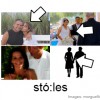
Stó:les is the Halq’eméylem word for ‘wife’.
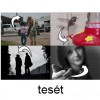
Tesét means ‘to approach’, ‘to go up to’, or ‘come near to’. For example: Tesétes tútl’o te stó:les. – ‘He went up to his wife.’ Teséthox – ‘Come near me’.

“Olsu stl’í kw’es yeláwels x̲wém kw’el kyó,” x̲ét’e tútlo. means ‘He said “I want my car to be faster”‘. Literally it means: ‘ “So my want (is) that more fast (is) my car,” said he’.

Olsu stl’í kw’es yeláwels x̲wém kw’el kyó means ‘I want my car to be faster’. Literally it means: ‘So my want (is) that more fast (is) my car’.

…kw’es yeláwels x̲wém kw’el kyó means ‘…that my car is faster’. Literally it means: ‘…that more fast (is) my car’.

Yeláwel x̲wém kw’el kyó means ‘My car is faster’. Literally it means: ‘More fast (is) my car’.

X̲wém kw’el kyó means ‘My car is fast’. Literally it means: ‘Fast (is) my car’.

X̲wém in Halq’eméylem means ‘fast’ and also ‘to hurry’. Note: there is another unrelated word, stím, which also means ‘fast’.

El stl’li kw’els yeláwel éy kw’e lamál há:we, x̲ét’e tútl’o means ‘He said “I want to be better when I go hunting”‘. A literal translation would be: ‘My want (is) that-I (am) more good when go-I hunting, said he’.
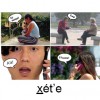
X̲ét’e is the Halq’eméylem word for ‘to say’. Note: Elders use this word interchangeably with another word, thét, which also means ‘to say’.

El stl’li kw’els yeláwel éy kw’e lamál há:we means ‘I want to be better when I go hunting’. A literal translation would be: ‘My want (is) that-I (am) more good when go-I hunting’.
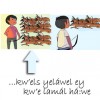
…kw’els yeláwel éy kw’e lamál há:we means ‘…that I am better when I go hunting’. A literal translation would be ‘…that-I (am) more good when go-I hunting’.
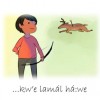
…kw’e lamál há:we means ‘…when I go hunting’.
